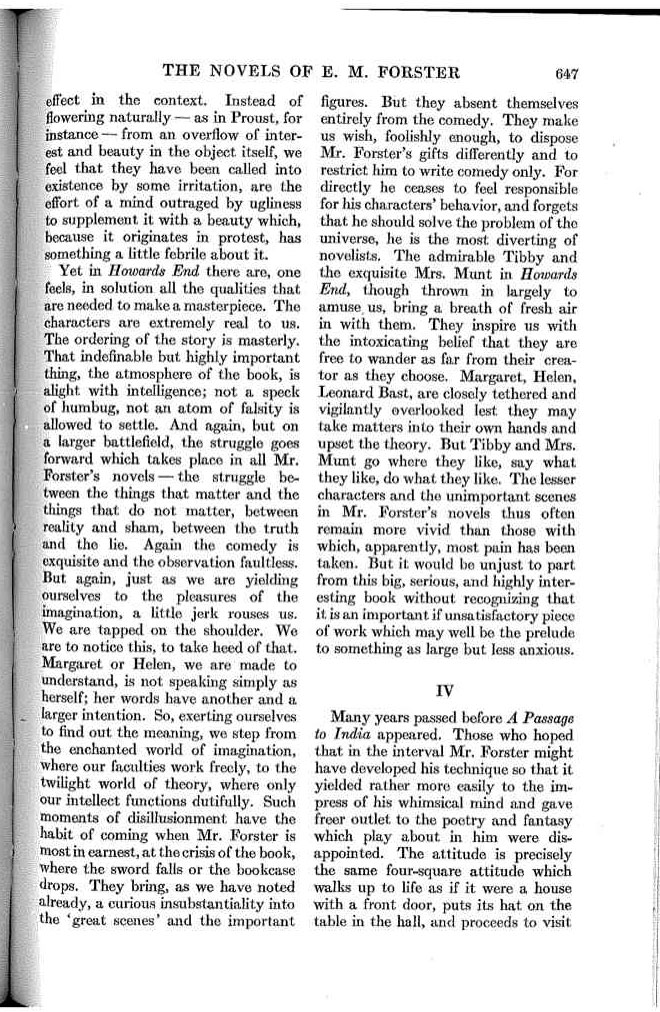
effect in the context. Instead of
flowering naturally—as in Proust, for
instance—from an overflow of inter-
est and beauty in the object itself, we
feel that they have been called into
existence by some irritation, are the
effort of a mind outraged by ugliness
to supplement it with a beauty which,
because it originates in protest, has
something a little febrile about it.
Yet in Howards End there are, one
feels, in solution all the qualities that
are needed to make a masterpiece. The
characters are extremely real to us.
The ordering of the story is masterly.
That indefinable but highly important
thing, the atmosphere of the book, is
alight with intelligence; not a speck
of humbug, not an atom of falsity is
allowed to settle. And again, but on
a larger battlefield, the struggle goes
forward which takes place in all Mr.
Forster's novels—the struggle be-
tween the things that matter and the
things that do not matter, between
reality and sham, between the truth
and the lie. Again the comedy is
exquisite and the observation faultless.
But again, just as we are yielding
ourselves to the pleasures of the
imagination, a little jerk rouses us.
We are tapped on the shoulder. We
are to notice this, to take heed of that.
Margaret or Helen, we are made to
understand, is not speaking simply as
herself; her words have another and a
larger intention. So, exerting ourselves
to find out the meaning, we step from
the enchanted world of imagination,
where our faculties work freely, to the
twilight world of theory, where only
our intellect functions dutifully. Such
moments of disillusionment have the
habit of coming when Mr. Forster is
most in earnest, at the crisis of the book,
where the sword falls or the bookcase
drops. They bring, as we have noted
already, a curious insubstantiality into
the 'great scenes' and the important
[new column]
figures. But they absent themselves
entirely from the comedy. They make
us wish, foolishly enough, to dispose
Mr. Forster's gifts differently and to
restrict him to write comedy only. For
directly he ceases to feel responsible
for his characters' behavior, and forgets
that he should solve the problem of the
universe, he is the most diverting of
novelists. The admirable Tibby and
the exquisite Mrs. Munt in Howards
End, though thrown in largely to
amuse us, bring a breath of fresh air
in with them. They inspire us with
the intoxicating belief that they are
free to wander as far from their crea-
tor as they choose. Margaret, Helen,
Leonard Bast, are closely tethered and
vigilantly overlooked lest they may
take matters into their own hands and
upset the theory. But Tibby and Mrs.
Munt go where they like, say what
they like, do what they like. The lesser
characters and the unimportant scenes
in Mr. Forster's novels thus often
remain more vivid than those with
which, apparently, most pain has been
taken. But it would be unjust to part
from this big, serious, and highly inter-
esting book without recognizing that
it is an important if unsatisfactory piece
of work which may well be the prelude
to something as large but less anxious.
IV
Many years passed before A Passage
to India appeared. Those who hoped
that in the interval Mr. Forster might
have developed his technique so that it
yielded rather more easily to the im-
press of his whimsical mind and gave
freer outlet to the poetry and fantasy
which play about in him were dis-
appointed. The attitude is precisely
the same four-square attitude which
walks up to life as if it were a house
with a front door, puts its hat on the
table in the hall, and proceeds to visit






